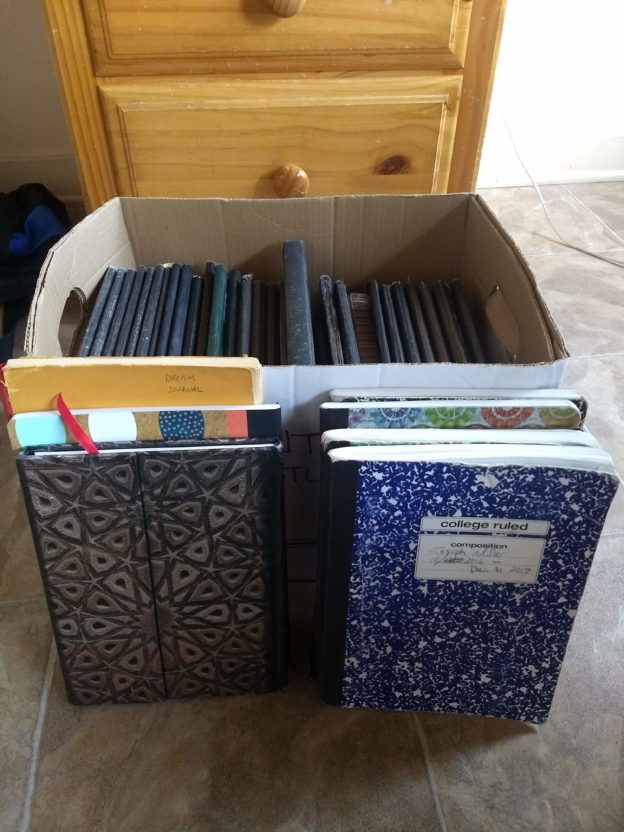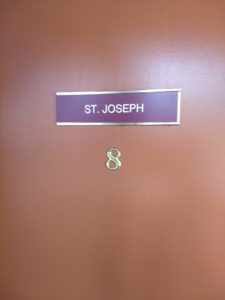A year before the pandemic, the author sequestered himself in a monastery room for five days with 37 volumes of his life record.
By Joseph Miller
In February of 2019 I retreated to a monastery with a 30-pound box of journals. Having blocked-out the better part of a week from my schedule, I extracted myself and drove up the California coast for four hours to a Benedictine monastery perched high on a mountain overlooking the Big Sur coastline. The remote New Camaldoli Hermitage is located near the center of a breathtaking 70 mile stretch of a two-lane ribbon which hugs the juts and recesses of mountain slopes that plunge to the Pacific. Amplifying the sense of remoteness is the fact that rockslides frequently plague these steep slopes, collapsing the road or burying it utterly.
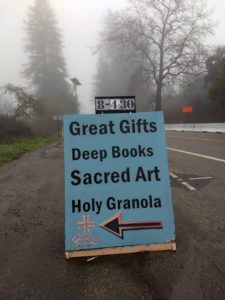
a call to the sacred
The turnoff from the highway is marked by a quirky sandwich board promising “Deep Books” and “Holy Granola”. The effect, instantly disarming, suggests the monks have not only a sense of humor, but market savvy. Banished for the moment was any fear of meeting repressed sorrowful cloisterers at the end of the two-mile drive up the mountain. A few words with the attendant monk at the bookstore (the only place where speech is permitted for retreatants) conveyed solidity, yes, but not weightiness. And if I had wondered if Deep Books meant only Catholic tracts, I was refreshed by the breadth of offerings. Reprints of classic Benedictine texts were available, yes, but also contemplative gems from Hindu, Sufi and Buddhist traditions. The monastery is ten miles down the highway from the alternative spirituality haven, Esalen, born of the 1960’s counterculture, an alembic for yoga, psychedelics and Transpersonal psychology. I wondered whether Old Deep and New Deep, in such close proximity, have much to do with one another. I have heard of monastery retreatants sneaking off in the night to luxuriate in Esalen’s hot tubs. I myself would have, too, had the weather been better, and had I internet access to make a reservation.
But internet access would have sinned (pardon the term) against the very aim of my retreat. And if I had to choose between a 2:00 am naked, pagan, moonlit bath in sulfur hot springs, serenaded by crashing waves and barking sea lions in the dark, or my tiny retreat room with only Saint Romuald’s rule and a crucifix on the wall—I would, alas, choose the latter, if only to be shielded from internet temptation. As my cargo made clear, my purpose was pen and paper, not glowing screens or sensuous excursions. I had paid to be unplugged and stay put, and I wanted my full money’s worth of nothing.
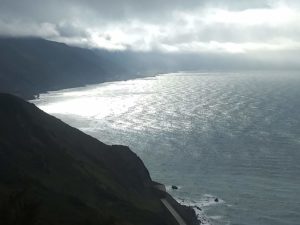
Pacific Ocean from the hermitage
I felt uneasy about bringing the journals along. Every hour in my ordinary life seems enmeshed in a dozen contingencies, and the prospect of a few days of uninterrupted solitude was the highest luxury imaginable. Why would I wish to drag 37 volumes of the past with me? Aren’t I already expert at self-preoccupation? I once knew a philosophy professor who claimed he always ruined his vacations by bringing himself along. Might a few days of reading the journals risk opening old wounds, awaken sleeping dogs of shame, and dig-up unresolved narratives of the past? On the other hand, might they also reveal forgotten sparkles of insight, particles of wisdom that belong to me, but remain as ineffectual as a screwdriver lost at the back of the junk drawer.
I felt pushed also by mortal urgency. My adult daughter, a few months earlier during a visit home, was reviewing with my wife details of our estate, when she came to me with the question, “What do you want done with your journals?” She meant, of course, when the inevitable takes place. It was a question I occasionally asked myself, but always dodged. I knew it had to be faced by someone at some point. “But why now?” I squirmed, “Are we already at that point?”
In short, I felt not only ambiguities about facing the past, but positive dread of running what amounted to a five-day solo marathon saddled with the 30 pounds and 6,500 pages, pushing for a resolute decision I could live and die with. After all, when else would I indulge such an elevated perch? How else to gain perspective? If not now, when? Clearly, from the outset, the project was doomed. I would almost certainly return to everyday life, not refreshed, but a dizzy, exhausted failure. Why, then, did I bother bringing the journals?
This was their maiden voyage. The journals had never left home before—as a group I mean. Only six of the notebooks pre-date the house I moved into in 1990, and I have never lived anywhere else since. The journals began in 1982, only months before I moved to Santa Cruz to attend UCSC. In fact, just weeks after scribbling the first entry I drove Highway 1 through Big Sur for the first time and was ignited into ecstasy by the raw elemental beauty. A native of Los Angeles, familiar with the sandy recreational beaches of Malibu, Carpinteria and Santa Barbara, I had never dreamt such brave new coastline lay undiscovered only hours up the road. My decision that weekend to transfer to UCSC was influenced as much by those few hours along Big Sur as by the arboreal campus in the redwoods. My life of 21 years was making a decisive turn from the past, towards philosophy, poetry and inwardness. Every gliding gull was Jonathan Livingston Seagull.
So, one notebook in the box, the first, had already been up this highway, 38 years before, constituting a thread and a distant echo. The journals, taken as a whole, are a running witness in ink to the ineffable Something my younger self affirmed that spring weekend in 1982. Maybe I have maintained the practice, partly, out of a desire not to let him down. He was hopeful and hungry and vulnerable, desperately in need of support. What better way to prove he was not merely a dreamer than by keeping the dream alive? He turned to the journal to say things he could risk saying nowhere else, not because they were scandalous or salacious; but because they were existential, ontological and ultimate. He was in dead earnest, and acquaintances don’t like earnest. Parents don’t like earnest about these sorts of things—they like earnest about medicine, law and business. No one wants a weirdo for a son. That’s why Asian legend depicts King Śuddhodana taking elaborate pains to shield his son, Siddhartha, from the frayed edges of life: the facts of disease, cruelty, old age, poverty and death. But the shield failed, and Siddhartha never became a king, warrior, or businessman. He became a buddha. (And I went into drapery work; but that’s another story.)
I started writing in order to find my voice. An awkward, distracted, anxious, guilt-ridden young man, I was haunted by a fear of falling behind and being left out. I heard no calling. I shrunk from the spotlight adults were always turning on me, “What do you want to do?” I didn’t want anything (nothing that I would tell them, anyway), and I felt ashamed by that fact. But in 1981 while attending lectures by a brilliant UCSB professor, something within me stirred, and I conceived, among other things, a hunger to make better friends with words. Journaling seemed to be the best method for pinning my mind to the present tense and sense. I had never been much of a reader before that, far too distracted. But I soon discovered that the writing of words and the reading of books fed one another. What better way to become a more nuanced and retentive reader than to record quotations and page references? To restate and wrestle with argument, and so make it more your own?
Thoreau wrote, “Associate reverently and as much as you can with your loftiest thoughts” [Journal, January 22, 1852]. The journal has been my method for recording my most elevated attitudes and broadest visions. The act of writing is reinforcement. The rereading of an entry on a later date is an invocation of the memory and feeling. Absent the journal, where would all the subtle experiences (which are really the deepest and most causal) end up, except oblivion? It seemed to me at the time, long before popular articles on brain science gave support, that practicing my best thinking was not only pleasant, but a good safeguard against invasions of negativity and depression.
I was writing not to express what I already knew, but to discover what I didn’t know I knew.
The physical journals are almost all college composition books—cheap, uniform, and readily available. To choose one sort of medium and stay with it appears to unify the endeavor. The line of journals on my shelf seems to suggest that I have been living one life, ensouled by one purpose, not fragmented into a series of disconnected episodes. The suggestion is not entirely wrong. A hunger for meaning, the quest for faith (confidence, not doctrine), the untangling of themes from classic scriptures, East and West, and a philosopher’s penchant for upsetting habitual viewpoints—these threads run through all the volumes. On the other hand, the journals also record a host of short-lived illusions, preoccupations, and obsessions. Were these to take form, and not hide between cardboard covers, they would litter the shelf with a hodgepodge of rubbish. But they are between the covers, and if my life is not neatly unified by one purpose, at least I have wrestled with it through a singular method.
The blank page is clean potential, a block not yet carved by experience. I go to the journal to dwell on the shore of this emptiness, the way I stand on the beach to gaze seaward. The new line I write—this very one right now—is always the far edge of my writing. The present line is forever a divide between what was and what shall be, between the formulated and the unformed. No matter what problem oppresses me today, to look at the blank page ahead is to touch something new, clean, unborn and inexhaustible, not apart but belonging to me. No sooner do I think my failures have put me in a box, and all but nailed the lid, then I open the journal to write that down, and soon feel the vanity of the claim. The open page means nobody has had the last word.
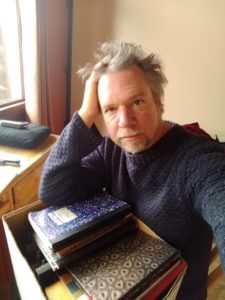
author with his “laptop”
I know there are skeptics of paper navel-gazing. I can hear the question, “What might you have accomplished otherwise, with all that time spent writing? Surely, there are profitable actions you might have pursued.” Actually, you will be surprised by how little time I have spent writing. If my pitch for journaling has a bottom line, it is this: a small investment yields big dividends. I am not a professional writer, but someone who scribbles in the margins of ordinary life. If you figure I spend 15 minutes per page, then 6,500 pages represents only 68 continuous days and nights. That’s only 1,632 hours, which is less than a fifth of Malcolm Gladwell’s formula of 10,000 hours to mastery. And I’ve been at this for nearly four decades—not a promising pace! By that criterion I would require a lifespan of more than 200 years to become an accomplished writer. A dedicated music student, by contrast, who practices three hours a day, clocks her 10,000 hours by the time she is 18. Mine is a paltry commitment, really. An adolescent who spends 8 hours a day on social media and gaming whizzes by me in just over six months! This child spends one-third of his life at his obsession; I have spent only .005 or five-thousandths at mine. That averages 7 minutes and 12 seconds per day—about half a page; or, what is more my pattern, 22 minutes every third day. Hardly a theft from practical living.
It has been my habit to turn to the journal only when I have something to say, or when possessed by the urge to work out how to say something. I have never set myself before the page with the imperative WRITE! I was writing as much to shape myself as to shape my prose. I was writing, as my philosophy professor, Carlos Noreña, used to say, not to express what I already knew, but to discover what I didn’t know I knew. I was writing to add solidity to my being, “to give airy nothings a local habitation and a name”. I was writing to translate moods—which in the words of the Irish mystic AE, “belong too much to the twilight of the heart”—into something more definite. “We should wish rather for our thoughts a directness such as belongs to the messengers of the gods,” he continues, “swift, beautiful, flashing presences bent on purposes well understood.”
The chief motive, as I’ve said, was to record advice to myself, reminders of attitude and perspective. But I eventually discovered that these degenerate into saccharine evasions unless I also make room for darker material. Flowers and sunsets are beautiful, but they are only a portion of a larger world which includes ignorance, death, conflict, and eerie unseen caverns. Certainty feels good for a while, but it becomes forced, defensive and self-righteous once it has an eye in the mirror. Follow the truth today, though it erases yesterday’s philosophy, unties all the pretty bows, and descends into the shadow of the valley of death. There is truth in the candid admission, “I don’t know the truth anymore.” Reading yesterday’s words does not guarantee access to their sense and animating spirit. Truth is never so caged; it requires new clothing each day. A truthful journal is the chase of a moving target, and a record of wasted arrows. Uncertainty, paradoxically, promises a more secure footing. Nothing is so top-heavy as self-satisfaction. There may be less Promise to my philosophy, but more promise for my method; less face to save and therefore better boots. Uncertainty negates the selfish illusion that I occupy a privileged, final vantage. Etymologically, to conclude is “to shut completely.” The conclusion of breath is death. A novice house painter can paint herself into a corner; and a writer can do the same.
My young journal displays idioms I picked up and tried to use without really understanding them. I hadn’t yet coined my own currency. I had yet to earn my vocabulary in the fields of experience. All authentic speech is original; not that it is abnormal or unusual, but only that its origins are verified directly. Think of the difference between two math students using the quadratic formula. Imagine one has derived it from completing the square, whereas the other engages it as a machine assembled by others. The first student can rebuild the formula, should she forget it. She can also use it with more confidence, since she has analyzed its rudiments. My later journals, in some passages, actively melt what former volumes so carefully minted. My early efforts, understandably, were attempts to display of a unified self; my latter ones are a patchwork of discrete observations and perspectives; even, quite literally, a scrapbook. The first volumes were animated by the hope of inking indelible truths; the later ones sketching tentative surmises.
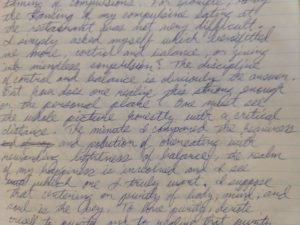
1983
The early notebooks, sadly, omit almost all biographical data. They are strangely disembodied. Reading the early volumes, I struggle to even know where I lived at the time, during my vagabond mid-twenties. Looking at some of these high-brow passages now, I want to shake the writer and ask him what he is hiding. Did he have indigestion? Who were his most important friends at the time? What about romantic infatuations? What career disappointments? Money problems? Personal doubts? Or grievances towards co-workers? Most embarrassing of all, during the period of courting of my wife, there is no mention of her name, our first kiss, our engagement, nor any reference to our wedding. To be kind to my former self, I remember choosing to keep the journal from becoming a diary. It was an idea book, I insisted. After all, a naturalist’s notebook, or a mathematician’s, would also exclude biographical detail. That’s the sort of thing I had in mind.
But I also knew that recording biographical detail would mean vulnerability, and I didn’t want to go there. I wanted to outgrow the hang-ups I was hiding, the sooner to forget about them, not fold them in with my golden metaphysical and psychological distillations. Perhaps the wisdom I was recording (I dared not admit) could be read profitably by someone in the future. But if the pages also recorded a self-doubting, posturing, despairing young writer—what good would that do? It would only cast doubt on the value of the wisdom, which evidently failed to aid the first and most important reader.
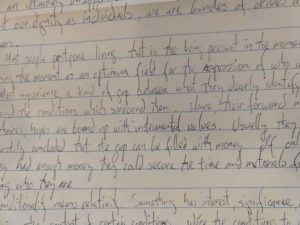
1997
But all this changed in time. Concert and theater ticket stubs get pasted in. References to events, people, bad moods and gripes about my upbringing are dwelt upon. Even a few extremely painful fits are laid open in all their ugliness, without any effort to soothe or salve them. Short notations about phone calls, conversations, flirts, slights, travels and purchases appear. As I age, I’ve come to see that the best language for life is life itself, and my own dignity demands liberty from any summary. I’ve come to mistrust tidy reductions and simple solutions. But at the same time, these are not the journals of a cynic, or a worldly man. Far from it! Flights of faith, mystical moods, and philosophic analysis continue to burst through the pages. But their potency is greater now for their brevity, more welcome for their unsolicited appearance and unconstrained departure. Lightning now strikes during ordinary life, where it is most needed, not blinding the eyes and obliterating the world’s detail but jarring the senses and illuminating the heavens for an instant, if only to shine on duller common moments.
There is this empirical side to the journals—drastic changes in my handwriting, which over the course of 38 years, begins illegibly, approaches something like beauty and clarity after 15 years and degrades thereafter. But just as the feebleness of age is not identical to the weakness of a child, so also my writing. The first was cramped-hand, forward-blown cursive, the tortured, imitative penmanship of Catholic school regiment; the latter is an idiosyncratic block script strangely crossbred with a year’s training in the Greek alphabet. The first, like an art student’s initial efforts, is forced and over-worked. The latter resembles more the mature artist’s quick strokes: partial, disconnected flits, incomplete gestures, neglected crossings and dots. Both are atrociously unreadable by anyone but me. For many years I thought my wife exaggerated the difficulty of reading my handwriting. And then, just a few years ago, I accidentally discovered the truth with a shock. Here is a very simple test, I suggest you try it with your own writing. It is a fact that most of us can read typed copy upside down. Open a book, turn it over, and read a paragraph. I can do it alright, and I’m guessing you can too. But if I turn my journal upside down, it is impossible for me to read anything! I am suddenly locked out of myself, a stranger to my own mind.
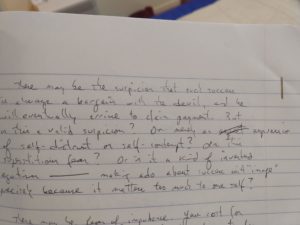
today
The monastery bell chimes several times a day, beckoning monks and visitors to vigils, lauds, vespers and Eucharist. I am not Catholic and did not attend these meetings. But towards the end of my retreat, feeling too saturated with the weight of my seclusion, I heeded the bell one morning, and scrambled out of bed, through the dark and rain, to attend the 5:30 vigil. The Camaldolese are especially dedicated to the chanting of the Psalms. The low light, and the droning unison of the ten monks that morning, put me in contact with something very old, but also left me wondering, Is this still relevant? Why chant these old Hebrew tribal petitions now, in this age, in this land and language? I was glad at least to show my face and pay respects. If my stay was to be something more than a financial transaction, and the hermitage something more than a hotel or hostel, then three-quarters of an hour given to this gathering was the least I could do.
The new line I write—this very one right now—is always the far edge of my writing. The present line is forever a divide between what was and what shall be.
Then, the chanting stopped, and one of the monks began to speak. I had not heard any talk for five days, and I found myself as dilated as an eye emerging from a cave. Father Cyprian Consiglio—who I later learned is the Prior, and an accomplished musician/composer—gave a gentle homily. If this was first light, it was easy on my eyes. And it demonstrated a seamless meeting of the Old Deep and New Deep I had wondered about days before. The New Testament text was, “Whoever does not receive the kingdom of God as a little child will never enter it.” Yet, the references Consiglio displayed to build his argument were no child’s play: his graduate studies, philosopher Ken Wilbur, post-modern values, pre-modern cultures, and Transpersonal psychology. This was a dazzling pivot from the Psalms; here was my surprise landing in Esalen without reservation! Consiglio, however, was brief, and the content was not gratuitous, but finely pointed, delivered conversationally, and capped by a touching personal anecdote. He described a beloved photo of his father, advanced in age, holding his baby niece. The two were very close, and displayed similarities. They both were a little wobbly on their feet; they spoke in halting words; they both loved naps. There was a parallel simplicity, noted Consiglio, whose master’s thesis had been on the Garden of Eden. “But Dad’s simplicity was different from Aria’s simplicity. Dad’s was a simplicity born of experience––and maybe some fatigue, and a certain mistrust of words, as if everything important had already been said and there was no use debating things anymore. Aria’s simplicity was based on the fact that everything was ahead of her; for Dad most everything was and is behind him now.” [Read full homily posted HERE].
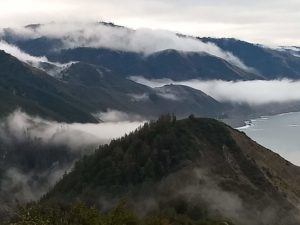 But what was I to do with the journals? The question remains. 6,500 pages are behind me, but do I believe everything important has already been said? All writing is book-ended by two great silences. Maybe I should return my words to the silence deliberately, consciously, as the final entry, with flaming pen, while I am still alive. That would be the ultimate erasure. Perhaps a ritualistic act, a rite of passage, a beach bonfire on some significant birthday, dancing and drumming in the flickering light. Maybe my 70th . . . or my 60th, which is only next year! 40 minutes for 40 volumes, with a sentence or two sung aloud from each. I still squirm, “Are we already at that point?”
But what was I to do with the journals? The question remains. 6,500 pages are behind me, but do I believe everything important has already been said? All writing is book-ended by two great silences. Maybe I should return my words to the silence deliberately, consciously, as the final entry, with flaming pen, while I am still alive. That would be the ultimate erasure. Perhaps a ritualistic act, a rite of passage, a beach bonfire on some significant birthday, dancing and drumming in the flickering light. Maybe my 70th . . . or my 60th, which is only next year! 40 minutes for 40 volumes, with a sentence or two sung aloud from each. I still squirm, “Are we already at that point?”
My journals represent four decades of self-discovery and self-expression. Whatever the changing forms, conditions, and relations of my outer life, this at least has been a constant: the line of ink running left-to-right, margin stop, and back again; the past above, the future below; the unseen current of thought expressed through a visible thread of vowels and consonants. I have yielded to an urge to say to myself and for myself what matters, what is relevant, engrossing, inspiring; what is real, what’s happening; and what’s it all about. The journal has been my way of deliberately accepting the burden of living—refining it, owning it, putting myself to a point.

